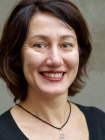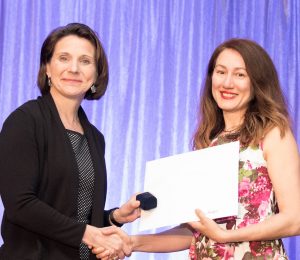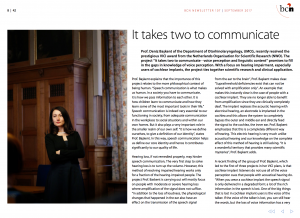Deniz Başkent researches the role played by cognitive aspects in speech perception and how brain training can compensate for hearing impairment. She heads multidisciplinary research teams of behavioural and cognitive scientists and researchers with a technical background. She maintains unique collaborations with users of hearing aids and cochlear implants, with the manufacturers of these aids, and with local and international researchers. A notable feature of her work is the close link between her research and its application. The jury described Başkent’s work as being especially relevant for users of cochlear implants, which replace normal acoustic hearing with electrical hearing.
Huibregtsen Prize
The Huibregtsen Prize, named after Wouter Huibregtsen, was established in 2005 by the board of the Stichting De Avond van Wetenschap & Maatschappij (Evening of Science and Society Foundation). The prize goes to a recent research project that is scientifically innovative and with clear relevance to society. A maximum of six projects are nominated each year, one of which is ultimately awarded the Huibregtsen Prize. The principles guiding the jury’s choice were scientific excellence, a departure from the beaten track, originality and greater societal relevance than might be expected within the discipline. The prize will be awarded at the Evening of Science and Society in the Ridderzaal in The Hague. It consists of a sculpture, ‘The Thinker’ by visual artist Wil van der Laan, a sum of €25,000 that is earmarked for research activities, and a workshop offered by the Lorentz Center in Leiden.
Evening of Science and Society
The Evening of Science and Society was established in 2000 to emphasize the importance of science for society by showing where and how scientific research finds applications in daily life. Leading scientists and prominent figures from other sectors of society will debate topics sparked by scientific research.
More information
Information about Deniz Başkent’s research can be found in the following articles from KennisInZicht, the UMCG’s scientific magazine:
https://kennisinzicht.umcg.nl/(…)
https://kennisinzicht.umcg.nl/(…)-slechthorenden.aspx
Information about the VICI grant awarded to Deniz Başkent in 2017 by the Netherlands Organisation for Scientific Research (NWO) can be found in the following report:
https://www.rug.nl/(…)of-groningen-in-2017
 Deniz is elected to be a member of the
Deniz is elected to be a member of the 
 Deniz is elected to a Fellow of the Acoustical Society of America, “For contributions to our understanding of acoustic and electric auditory and speech perception.” Link
Deniz is elected to a Fellow of the Acoustical Society of America, “For contributions to our understanding of acoustic and electric auditory and speech perception.” Link  A very nice interview by Elouise Koops covers our new VICI grant in the BCN newsletter.
A very nice interview by Elouise Koops covers our new VICI grant in the BCN newsletter.